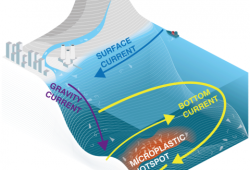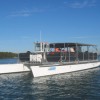Deep Sea Microplastics

Seafloor microplastics are controlled by deep sea currents according to a new report published in the journal Science. This study shows how deep-sea currents act as conveyor belts, transporting tiny plastic fragments and fibres across the seafloor. These currents can concentrate microplastics within huge sediment accumulations, which the authors of the research term ‘microplastic hotspots’. These hotspots appear to be the deep-sea equivalents of the so-called ‘garbage patches’ formed by currents on the ocean surface.
Follow this link to read more about Seafloor Microplastic Hot Spots.
Solar Boat

There are many environmental benefits to be found when using an electrically driven Solar Powered catamaran as opposed to more conventional fuel driven vessels: · Silent running – therefore no disturbance to birds, animals or humans · No exhaust emissions – therefore no CO2 contribution to greenhouse gases · The twin hull configuration contributes two major benefits; tremendous stability and no wash.... Read More»
Climate Change

The peninsula is particularly vulnerable to the effects of climate change including rising sea levels, rising water table, and more intense precipitation. As a result, the MPP has been working closely with the community to raise levels of awareness and to help produce adaptation plans. These include: practical adaptations funded through a Community Grant Fund including the installation of... Read More»
Sea's the Day Recipe Cards

The Recipe cards were the first part of the project to be completed and have been hugely successful. The aim was to take local catch and show you wonderful recipes giving you ideas about how to cook it in your own kitchen. Many restaurants across the Manhood Peninsula take pride in serving local produce, particularly seafood, and kindly agreed to... Read More»